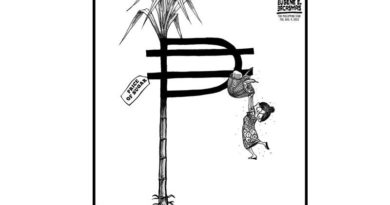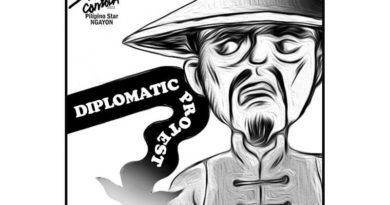EDITORIAL-OPINION: Develop resilience thinking in students

THERE is no sign of a slowdown in the Covid-19 outbreak. While we rely on medical and life sciences to develop a cure, liberal arts education has a role to play, especially in the face of the fake-news pandemic, panic buying, and the growing xenophobia and racism related to the disease.
Dr Wong Kok Keong highlighted in “Key role for liberal arts” (Speak Up, March 10) that a liberal arts curriculum should “empower students with the lifelong ability of problem solving through thinking outside the box and living meaningful lives through thinking critically and creatively.”
Indeed, liberal arts education encourages students to challenge norms and perceptions across disciplines. The ultimate strength of a liberal arts education is in its ability to nurture resilience thinking in students.
 Ads by: Memento Maxima Digital Marketing
Ads by: Memento Maxima Digital Marketing
@ [email protected]
– SPACE RESERVE FOR YOUR ADVERTISEMENT
But what is resilience thinking?
It is necessary to first delve into the term “resilience”, which refers to the ability to cope and recover promptly from any form of adversity. Yet, in reality, it is not easy for individuals to actualise their resilience, as negative emotions could shake their stand. This is especially true for many millennials, whose difficulties have been buffered by their parents.
Let’s also not forget that we now live in a globalised world, where issues from outside our national boundaries that once seemed distant are now affecting us more than we think they would. From the war on terrorism, to the US-China trade war, and the Covid-19 pandemic, adversities can come from anywhere. This worlding process also brings about pluralistic viewpoints from within societies and organisations. Moreover, we must also recognise that our access to ready tools and infrastructure varies between cultures and societies.
It is therefore important for our future generation to accommodate different ways of thinking, which bridges geographical and cultural divides. Resilience thinking is really about identifying opportunities in times of change through forming new perspectives from building global connections and networks. Resilience thinking challenges the idea of automatic thinking, which is learned and habitualised through one’s social construct.
 Ads by: Memento Maxima Digital Marketing
Ads by: Memento Maxima Digital Marketing
@ [email protected]
– SPACE RESERVE FOR YOUR ADVERTISEMENT
With more technological breakthroughs to come, the world in which we inhabit will continue to become smaller over time. It is therefore more crucial than ever for our leaders of tomorrow to be equipped with the right capabilities to deal with the evolving globalised informational society.
In Malaysia, many universities and colleges have incorporated liberal arts into their core curriculum for the entire student body regardless of disciplines. However, on further observation, the current curriculum focuses mostly on communication skills, teamwork, social skills, digital literacy, just to name a few. While they are useful subjects, there seems to be a missed opportunity to fully use the liberal arts education in nurturing resilience thinking in our students.
Institutions should incorporate philosophical investigations into a wide spectrum of dilemmas and failures from classical and contemporary sources. Students should be encouraged to face and share their challenges and failures through creative means, such as digital storytelling and role-playing games.
 Ads by: Memento Maxima Digital Marketing
Ads by: Memento Maxima Digital Marketing
@ [email protected]
– SPACE RESERVE FOR YOUR ADVERTISEMENT
In the pursuit of whole-person education, universities and colleges could also explore service-learning, a form of experiential learning by which students are required to develop, perform, and evaluate community engagement projects. In these projects, students often work with unfamiliar communities, hence, a greater need to internalise concepts of cultural diversity and cross-cultural communication in order to complete the projects effectively.
Internships are equally useful in building resilience, but more often than not, students undergoing internships are given low-level tasks. Internship coordinators and providers should therefore work closely to ensure that interns are given specific tasks at the workplace that would allow them to critically reflect on their experiences when dealing with diversities, difficulties, and failures.
Institutions could also take part in international initiatives relevant to diversity. One such initiative is the Erasmus+ Friends Intercultural Passport Award project, which seeks to inculcate undergraduate students, who might not have the opportunity to undertake cross-border exchanges and internships, with intercultural knowledge and sensitivities through virtual mobility.
 Ads by: Memento Maxima Digital Marketing
Ads by: Memento Maxima Digital Marketing
@ [email protected]
– SPACE RESERVE FOR YOUR ADVERTISEMENT
Berjaya University College is one of two universities in Malaysia to be part of this meaningful initiative and the institution is going full scale in encouraging its entire student body to be involved.
As part of the project, students are required to submit a digital story on Intercultural Awareness and Cultural Diversity as an entry to a contest, and take part in a massive open online course on the same topic.
Under the movement control order, universities and colleges in Malaysia are closed till March 31. Perhaps institutions could encourage their students to take this time to reflect on the conflicting issues surrounding the pandemic. This could be a step forward in developing resilience thinking.
Associate Professor Dr Benny Lim is the Dean of Faculty of Liberal Arts, Berjaya University College. Comments: [email protected]
THE EDITOR










